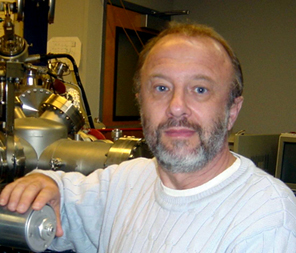Calit2 Layer Leader Ivan Schuller Wins Prestigious Lawrence Award
 |
|
Calit² Layer Leader for Materials and Devices at UCSD,
Ivan Schuller |
The Lawrence Awards are given in seven categories for outstanding contributions in the broadly defined field of atomic energy. Schuller was honored in the materials research category. Specifically, he was cited for creating the field of metallic superlattices and recognizing the impact of these materials on magnetism and superconductivity. Schuller is a professor of physics in the Division of Physical Sciences at UCSD.
Schuller and his fellow winners will each receive a gold medal, a citation and $50,000. "We are all enriched by the contributions these researchers have made ranging from engines with no moving parts to better ways to see the stars," said DOE Secretary Abraham. "These awards, and the research for which they are given, show that DOE could easily be called the Department of Science and Energy."
"Professor Schuller is a shining example of the strength and international stature of UCSD's faculty," said Marye Anne Fox, UCSD's new chancellor and one of the nation's leading organic chemists. "Roger Revelle's dream of building a university with the best and the brightest lives on at UCSD. I want to congratulate Professor Schuller on receiving this prestigious award and for helping to uphold the university's commitment to excellence."
Other 2004 winners include Nathaniel Fisch, Princeton University, Princeton, N.J., and Princeton Plasma Physics Laboratory (PPPL); Bette Korber, Los Alamos National Laboratory (LANL), Los Alamos, N.M.; Claire Max, University of California, Santa Cruz, and Lawrence Livermore National Laboratory (LLNL), Livermore, Calif.; Fred Mortensen, Los Alamos National Laboratory; Richard J. Saykally, University of California, Berkeley, and Lawrence Berkeley National Laboratory; and Gregory W. Swift, Los Alamos National Laboratory.
The Lawrence Award was established in 1959 to honor the memory of the late Dr. Ernest Orlando Lawrence, who invented the cyclotron (a particle accelerator) and after whom two major Energy Department laboratories in Berkeley and Livermore, Calif., are named. The awards will be presented at a ceremony in Washington, D.C., on November 8.
Schuller, one of the 100 most cited physicists in the past 15 years, graduated from the University of Chile with a physics degree in 1970 and received his M.S. and Ph.D. degrees from Northwestern University in 1972 and 1976, respectively. He became a naturalized citizen in 1980, when he was named Distinguished New Citizen. He was a senior scientist and group leader at Argonne National Labs and has been teaching and doing research at UCSD since 1987.
Schuller is Fellow of the American Physical Society, a member of the Chilean Academy of Sciences, a Corresponding Fellow of the Belgian Academy of Science and a foreign member of the Spanish Academy of Science. He received the DOE Award for Outstanding Accomplishment in Solid State Physics, the Wheatley and the Adler Awards from the American Physical Society, the Materials Research Society Medal and the German Alexander von Humboldt Prize.
The physicist's current scientific interests include the preparation, characterization and study of metallic superlattices, heterostructures and nanostructures. His research focuses on the connection between structure and physical properties, notably electrical transport, magnetism, superconductivity, and mechanical properties. Schuller has also dedicated considerable effort to popularizing physics through public lectures and educational television, and is currently finishing work on a documentary about nanotechnology to air on UCSD-TV and UC-TV in 2005. Together with Calit² New Media Arts layer leader Sheldon Brown, he has also initiated a distinguished speaker series for the institute that will highlight the intersection of science and creativity.
He joins an illustrious group of previous UCSD winners of the Lawrence Award that include Herbert York, a physicist who was UCSD's founding chancellor; Mark Thiemens, a chemist who is dean of UCSD's Division of Physical Sciences; James Arnold, a chemist who was the founding chair of UCSD's Department of Chemistry; and Sunil Sinha, a professor of physics.
Related Links
Department of Energy
DOE Office of Science Video
UCSD Integrated Nanosensors Lab
Thin Film Laboratory/Nanoscience Group
Calit2 Materials and Devices

